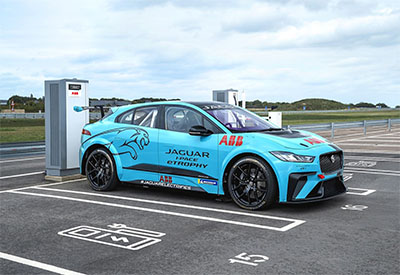Paving the way for e-mobility on the road and on water with ABB technology

May 15, 2019
As the title sponsor of the fully electric ABB FIA Formula E Championship series, ABB underlines its drive for a sustainable future. It is using its technological expertise to make this happen and to create electric mobility solutions on land and water. ABB’s e-mobility ambitions almost literally meet at the Monaco harbor this weekend for round nine of Season 5, where the ABB Formula E Gen2 racecars will weave around a harbour filled with boats, ships, and yachts in all shapes and sizes.
Maritime transportation is responsible for about 3 percent of global greenhouse gas emissions. That is why the International Maritime Organization (IMO) has set a target to reduce global shipping emissions by at least 50 percent annually by 2050 from 2008 levels. The electrification of vessels will be an important driver to reach this ambitious target.
As a pioneering technology leader, ABB has provided electrical systems for vessels since the early twentieth century, and today more than 1,300 ships employ ABB’s electric system. Increasingly, modern ships are being built on the foundation of electricity, which expands their range of viable energy sources beyond traditional fuel to, for example, batteries and fuel cells – both technologies in which ABB delivers specific expertise.
“ABB has provided electrical solutions for ships for over a century,” said Thomas Hackman, superyacht segment manager at ABB Marine & Ports. “We believe the future ships will be built on the foundation of electricity.”
ABB’s efficient and innovative technologies for sustainable marine transport are being used around the world. Only last week Niagara Falls tour operator Maid of the Mist announced that it has ordered two new passenger vessels that will operate on pure electric power, enabled by ABB’s innovative technology. These newbuilds will become the first US-built all electric vessels.
Benefitting from ABB’s zero-emission technology, guests will experience the Niagara Falls undisturbed by engine noise, vibration or exhaust fumes from a conventional engine. To make the voyage entirely emission-free, the batteries will be charged using locally produced hydropower.
“Reducing emissions at Niagara Falls is not only important for the natural landmark, but also proves that the technologies enabling sustainable mobility are already available today,” said Peter Terwiesch, President of the Industrial Automation business at ABB, which offers solutions for a wide range of industries, including marine.
In one of its most iconic electric marine projects, ABB powers Vision of the Fjords, a futuristic hybrid ferry in Norway. The ferry carries up to 400 tourists between Flåm and Gudvangen along the Nærøyfjord in the west of Norway, a distance of around 32 km. Once it has arrived in the most scenic part of the fjord, it switches to  battery power, allowing sightseers to enjoy the nature in almost complete silence at around 8 knots (approx. 15 km/h). The fjord is on UNESCO’s World Heritage List because it remains largely unspoiled by human development, and the ferry is designed with the surroundings in mind.
battery power, allowing sightseers to enjoy the nature in almost complete silence at around 8 knots (approx. 15 km/h). The fjord is on UNESCO’s World Heritage List because it remains largely unspoiled by human development, and the ferry is designed with the surroundings in mind.
ABB is also set to power Iceland’s first electric ferry beginning service later this year. ABB is supplying integrated power and electric storage solutions to the Icelandic Road and Coastal Administration’s new ferry traveling a route known for its harsh weather conditions, through rough waters between the mainland and the Westman Island.











![Guide to the Canadian Electrical Code, Part 1[i], 26th Edition– A Road Map: Section 56](https://electricalindustry.ca/wp-content/uploads/2022/11/Guide-CE-Code-2.png)



